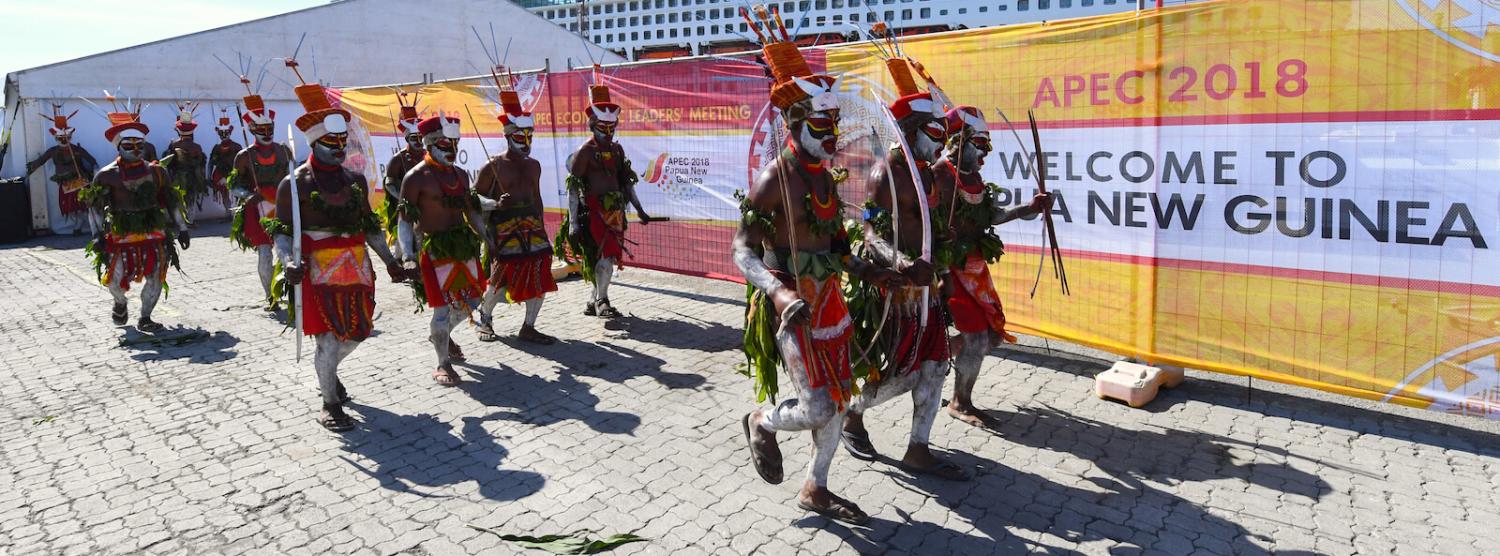The week that was on The Interpreter.
The biggest international summit to be held in the Pacific has come and gone. Shane McLeod and Jonathan Pryke with an ode to APEC in PNG:
APEC 2018 had it all: conflict, romance, an exotic setting, and a dramatic finale that will keep trade diplomats on the end of their seats for the next gripping instalment. Full credit to PNG. They’ve shown the world they can do a bang-up job of hosting an international summit. Although, the conversation on cost-versus-benefit will be a while in the analysis. The cliffhanger ending means APEC 2018 will be remembered for years to come.
Carlisle Richardson argues that following the duelling Pacific investment announcements at APEC, Australia should retool its Pacific relationships:
The current pivot to the Pacific islands may have been as a consequence of China, but the gap that exists in the relationship between Australia and its Pacific neighbours remains. It may be that the relationship needs to be fully reconfigured towards genuine partnerships and less towards convenient donor-recipient arrangements, or reactionary measures on issues more focused on Australian interests.
But one essential element to Australia’s regional policy was missing from the APEC announcements: health security. Adam Kamradt-Scott:
In the past few weeks as part of Australia’s ‘Pacific Step Up’, the government has announced new investments that include, among other things, redeveloping the naval base at Manus Island and supplying electricity to 70% of Papua New Guinea’s population. But health has not been mentioned.
And under the APEC radar, PNG’s Pacific neighbour Fiji held an election, with the Bainimarama-led government winning the country’s second poll since 2006. Christopher Mudaliar:
Opposition campaign platforms have changed remarkably – broadly attempting to follow in the footsteps of Fiji First’s popular country-wide social welfare, infrastructure, and nation-building programs. This meant instead of opting to fight Fiji First on the basis of their rise to power under illegitimate circumstances, opposition parties generally shifted to arguing that they could implement socio-economic reforms more equally, as well as more transparently than Fiji First.
And rounding out the Pacific news, Timor-Leste has made an agreement to purchase US energy group ConocoPhillips’ 30% stake in the Greater Sunrise oil syndicate. Michael Sainsbury:
The pipeline and concomitant multi-billion-dollar onshore infrastructure is fraught with economic and largely unexplored environmental risks. It is also littered with complex political hurdles – in particular, the move from traditional to individual land ownership that has already seen many billions of dollars in compensation payments set aside. These issues go beyond the deal and the mining industry itself and go to the very heart of Timor-Leste’s modernisation.
Possibly in response to Canberra's APEC announcements, China has launched an anti-dumping probe into imported barley from Australia. Alice Slevinson:
The likely explanation for China’s surprise announcement is that Beijing is angered by Canberra’s strategic undertakings in the South Pacific, and has meted out economic retaliation in response. Australia’s agricultural commodities are simply a pawn in the competition for strategic influence in the South Pacific. This follows after Canberra confronted China over what is seen as Beijing’s policy of interfering in Australia’s domestic politics and regional self-defined sphere of influence.
Back in China, Beijing faced an ideological conundrum in the form of unionising Marxist labour activists, who have since been rounded up by authorities. Simone van Nieuwenhuizen:
The problem is that Marxism at its core is a revolutionary ideology, and the CCP is no longer a party of revolution. Since Mao’s death, it has become a party of governance and control.
And another issue being pursued by the Chinese government, that Marx may have considered a new opiate of the masses, is the popularity of online gaming. Elliott Zaagman:
As the Chinese Communist Party has expressed a desire to reign in gaming’s influence on the country’s youth, even after approvals resume, it is highly likely that the best days for China’s gaming industry are already behind it. Party mouthpiece The People’s Daily referred to Honour of Kings as a ‘poison’ and a ‘drug,’ a term that carries considerable significance in China.
Finally, catch up on two stories from around Southeast Asia that are worth your while.
Aarti Betigeri writes about the growing attention on a fascinating place: the Andaman and Nicobar Islands.
In the absence of information (including decent mobile phone and wifi coverage), rumours flow like coconut toddy across the region, travelling from island to island with the boats. It’s believed that miscreants from Asia – particularly Myanmar and Thailand – like to use the Andamans as a convenient staging post to hide out in the jungle for a bit, then travel to the Indian mainland.
And Milton Osborne reflects on the genocide verdict at Cambodia’s Khmer Rouge tribunal:
It seems to me as I make my annual visit to the country that the past still hangs heavily over Cambodia, despite its booming capital and the recent tick of approval it has received from the International Monetary Fund. The sprouting of more than 50 high-rise buildings in the capital and the evident presence of great prosperity among the elite cannot blot out the past, no matter how much Hun Sen would prefer that this should happen. In this regard, my view is that, all things considered, the Khmer Rouge tribunal has played a useful if limited role.
